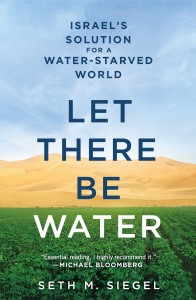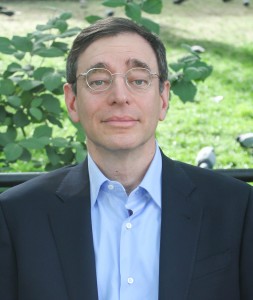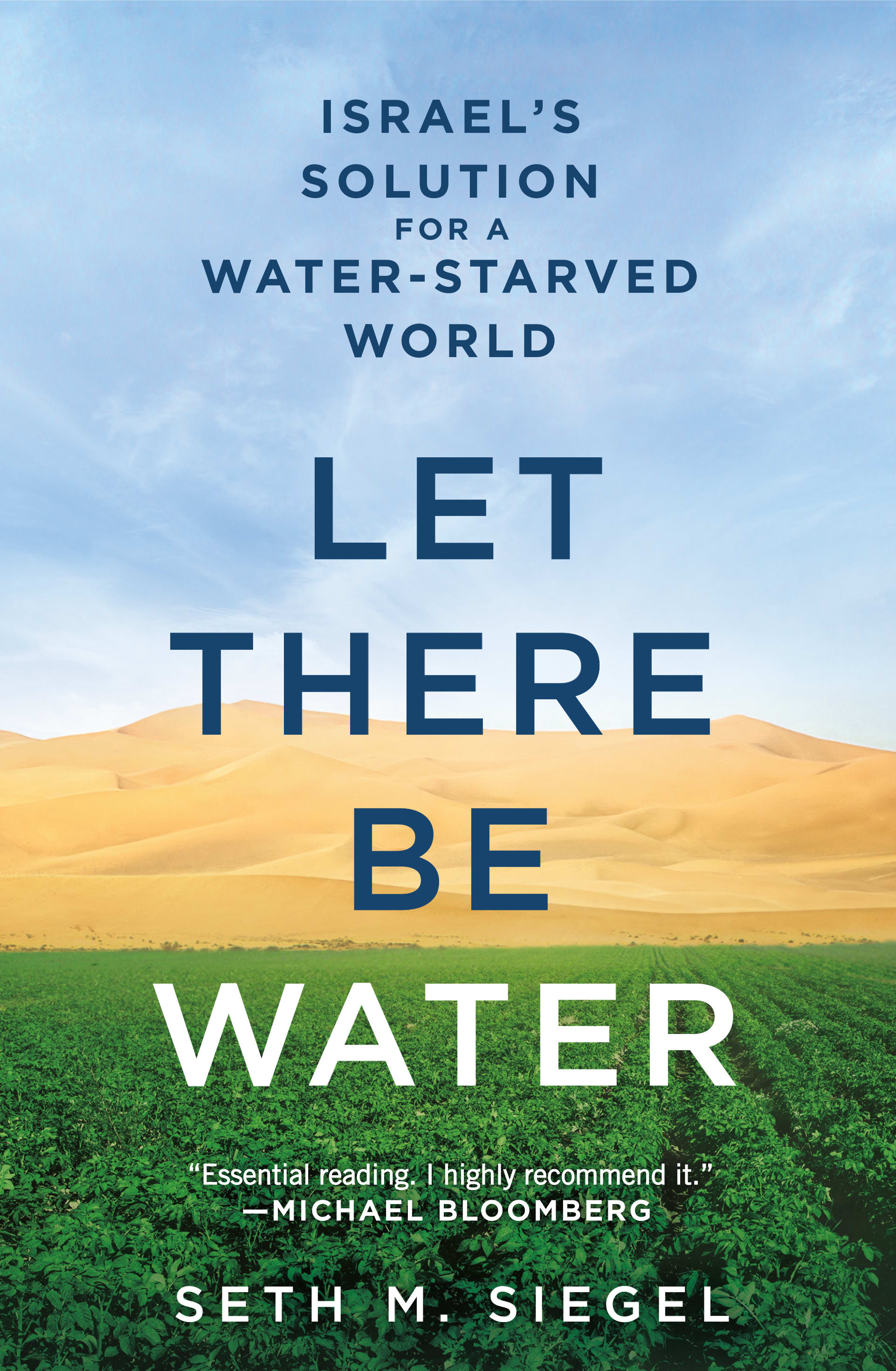 Seth M. Siegel is fond of the quote popularly attributed to Prime Minister Benjamin Disraeli: “If you want to properly acquaint yourself with a subject, write a book about it.” That’s what Siegel did. His debut book, “Let There Be Water: Israel’s Solution for a Water-Starved World” (St. Martin’s Press) goes on sale in September and stemmed from Siegel’s own interest in the looming water crisis. The book is already earning accolades from the likes of Michael Bloomberg, Shimon Peres and Tony Blair. Writing a book is the latest storied chapter in Siegel’s life. Siegel served as an assistant district attorney in New York for several years before launching Beanstalk, a trademark and brand extension agency, in 1990. The company grew to be the largest company of its kind and was bought by Ford Motor Company in 2001. Afterwards, Siegel decided to devote his life to working for the Jewish community. This marks his twenty-sixth year serving on the board of the Abraham Joshua Heschel School in Manhattan; he serves on the board of the Cornell Hillel and is a national board member of AIPAC. He lives on the Upper West side with his wife Rachel Ringel; they have three children. Siegel also served as a producer for the Tony-nominated play Man of La Mancha. He spoke with a staff writer at OU.org about his new book.
Seth M. Siegel is fond of the quote popularly attributed to Prime Minister Benjamin Disraeli: “If you want to properly acquaint yourself with a subject, write a book about it.” That’s what Siegel did. His debut book, “Let There Be Water: Israel’s Solution for a Water-Starved World” (St. Martin’s Press) goes on sale in September and stemmed from Siegel’s own interest in the looming water crisis. The book is already earning accolades from the likes of Michael Bloomberg, Shimon Peres and Tony Blair. Writing a book is the latest storied chapter in Siegel’s life. Siegel served as an assistant district attorney in New York for several years before launching Beanstalk, a trademark and brand extension agency, in 1990. The company grew to be the largest company of its kind and was bought by Ford Motor Company in 2001. Afterwards, Siegel decided to devote his life to working for the Jewish community. This marks his twenty-sixth year serving on the board of the Abraham Joshua Heschel School in Manhattan; he serves on the board of the Cornell Hillel and is a national board member of AIPAC. He lives on the Upper West side with his wife Rachel Ringel; they have three children. Siegel also served as a producer for the Tony-nominated play Man of La Mancha. He spoke with a staff writer at OU.org about his new book.
Q: Are we facing a water crisis?
A: There are five macro trends and these macro trends are independent of each other and each and every one of them is putting an enormous strain on our water supply, both globally and domestically. Although sometimes people think of water in local terms, the reality is what happens on the other side of the world does affect us because we get some of our produce from that side of the world. We reap the whirlwind of instability on the other side of the world in addition to our own problems.
Global population is growing. We’re at seven billion and the UN estimates we will be at 9.6 billion in 2050 when it levels out. That’s a lot of mouths to feed and people to bathe.

Not only do we have more people but we have a larger middle class though global affluence. That’s good news for everybody, but for water supplies, it’s a challenge. Things that make us middle-class are all deeply water consumptive. Electricity for our home consumes an enormous about of water. A pound of beef requires seventeen times as much water as a pound of corn to produce.
Third of all, and the most familiar macro trend, is climate change. Warmer temperatures mean more evaporation and more evaporation means more need for water to irrigate crops. The pollution of water is the fourth trend. Resources that have been taken off the grid because they’ve been polluted and that puts a strain on water to the degree we lose that water.
Finally, we have broken infrastructure in this country and the world. We lose an oceanic amount of water. Chicago loses 35% of its water to leaks; New York City loses more than 100 million gallons a day; Los Angeles, a third of its water. Not to mention countries like Jordan and Indonesia where they lose 65percent of their water in some cities.
When you take these five macro trends, you see that there’s more need for water and less water available.
Q: What is Israel doing right when it comes to water?
A: Israel is doing more things right than anyone else in the world. What Israel has is a multifaceted and integrated approach to water—an approach that can be called an all-of-the-above approach. You don’t take one solution, but understand that there is a need to use as many different tricks to get the solution you need.
One of the first methods was consumer education, to reduce the use of water. Second, Israel charges a real price for water that very few countries in the world do. People pay for what they use; they get all they want, but they have to pay. Israel also uses smart technology in agriculture. In Israel, there is not a single field that uses flood irrigation. Seventy-five percent of irrigated fields use a technique invented in Israel called drip irrigation. Next, Israel, to a degree unlike anywhere else, takes its sewage and treats it to a very high level and re-uses it in agriculture in a safe way. Therefore, every drop isn’t used once, it’s used several times.
Q: Why is Israel like that?
A: When it comes to conservation there are two mindsets. When the Zionists came back to the Land of Israel they understood the water limits there. Also, the Zionists respected technology and did whatfew other farmers did. They saw themselves as the ‘New Man’—Zionists recreated themselves, they changed their names and their approach to everything. One of these approaches was science experimentation. Farmers in other parts of the world had a more sedentary approach and were less likely to be innovative. The Israeli farmer was also a scientist and he experimented all the time. When I interviewed Shimon Peres for my book, he mentioned that when he was on a kibbutz, they had lot of olive trees. Someone asked: what happens if we irrigated the trees with hot water? What would it do to the olive oil? It sounds like a crackpot idea and it was, but it shows a mindset. Whereas that idea turned out to be nothing, other experiments turned out to be successful.
Q: If you had to pick the single greatest Israeli method, what would it be?
A: I would have to say drip irrigation. It’s a purely Israeli invention that has the potential to change the agricultural profile of the entire world. Drip irrigation is a means by which, instead of watering the entire field, you bring minute quantities of water to the roots of the plant so the plant gets all the water instead of the water dripping useless into the soil.
Q: Is drip irrigation used outside of Israel?
A: It’s used somewhat but not enough. The reason people don’t use drip irrigation is because, functionally, water doesn’t cost anything. As long as water is perceived to be free, why not flood the field?
Q: How did Israel come up with drip irrigation?
A: My book is populated by inspiring characters and no character is more inspiring than a man named Simcha Blass. Blass was the great water engineer of Israel and then he got into a turf dispute over a major infrastructure and quit in a huff. He was too young to retire— he was 59— and he began thinking about something he had seen in the 1930s where one tree in a field had been larger than all the others. He found an irrigation pipe next to the tree that had a tiny leak and thought by the steady dripping of water he might save water from evaporation; he didn’t anticipate that not only can you save water but you can increase your yield. He did experiments for four years and an Israeli kibbitz bought his technology and it was an overnight success.
Q: Is he the forgotten genius in this story?
A: Definitely forgotten, definitely a genius. What’s interesting about Blass is you could make the argument that he should have been entitled to the Nobel Peace prize, had he had a better publicist. He should’ve won the Israel Prize, but he won nothing because politics intruded.
Q: So how can Israel help the rest of the world?
A: The Israeli approach can be a model for the world. Israel has long-range planning. It properly prices water. But the value of drip irrigation to the world is so profound it also changes everything. Israel is a model for the world of what can be done and how it can be done. Israel has the technological devices and the operational approach.
Q: Will we run out of water in New York?
A: I doubt that will happen in New York City. New York gets a lot of rain, but scarcity issues have already affected California and Washington State and much of the western US.
Q: Do you think Israel’s use of water-saving technology can help its relationship to the outside world?
A: Absolutely. I make that point in the book. There are countries that vote against Israel in the UN but when it comes to water, they invite Israel in. It is hydro-diplomacy.
Q: Final question: Are you optimistic about humanity’s future when it comes to the looming water crisis?
A: I’m generally optimistic. I think people make the right choices late in the game—sometimes because that’s the only choice in the game. We’ve faced much worse challenges and overcome them. But if we continue to sleepwalk, or our politicians continue to defer making hard choices, then it’s going to be far far worse. Now is the time to act. Israel can show how.
You can follow Seth on twitter at @sethmsiegel and contact him through his website, www.sethmsiegel.com.
The words of this author reflect his/her own opinions and do not necessarily represent the official position of the Orthodox Union.
